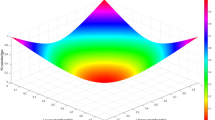Abstract
The role of Web-based social networks is increasing in our personal as well as professional life. We come across persons of varied natures, personalities, attitudes, beliefs, feelings, etc. A combined effect of extent of various personality attributes of a person creates an impression in one’s mind about the trustworthiness of that person. The level of trust that one assumes about the other determines future course of action with that person. This paper discusses the need and importance of trust when one interacts with others in a Web-based social network. Trusting an untrustworthy may pose dangerous consequences. It is not easy to precisely and accurately measure trustworthiness of persons interacting within a Web-based social network. The interaction is virtual rather than face-to-face. Not only individuals but even groups can act maliciously and adversely affect other individuals, groups or communities. Hence, it is imperative to have a trust determination technique which enables users to determine trustworthiness of others. The approach presented in this paper makes use of fuzzy logic to handle imprecise and uncertain information and determines trustworthiness by taking into consideration various personality attributes of individuals like their attitude, behavior, beliefs, honesty, responsibility. Final trustworthiness is evaluated by considering not only the individual’s perception but also taking feedback from independent third party and asking recommendations from peers. This makes determination of trust more accurate and reliable. The proposed approach has been simulated and validated using synthetic data set, and results show that it is flexible, is robust and can be adopted for the use in a Web-based social network for determining trustworthiness of participating peers, groups or communities.
Similar content being viewed by others
References
Chakrabarti A.: Grid Computing Security. Springer, Berlin (2007)
Deutsch, M.: Cooperation and trust: some theoretical notes. In: Nebraska Symposium on Motivation. Nebraska University Press (1962)
Firdhous M., Ghazali O., Hassan S.: Trust management in cloud computing: a critical review. Int. J. Adv. ICT Emerg. Reg. 4(2), 24–36 (2012)
McKnight, D.H.; Chervany, N.L.: Conceptualizing trust: a typology and e-commerce customer relationships model. In: Proceedings of the 34th Annual Hawaii International Conference on System Sciences (2001)
Menkes, R.A.: An economic analysis of trust, social capital, and the legislation of trust. Ghent, Belgium, LLM Thesis (2007)
Moturu S.T., Liu H.: Quantifying the trustworthiness of social media content. Distrib. Parallel Databases 29(3), 239–260 (2011)
Grandison T., Sloman M.: A survey of trust in internet applications. Commun. Surv. Tutor. 3(4), 2–16 (2000)
Golbeck J., Hendler J.: Inferring binary trust relationships in web-based social networks. ACM Trans. Internet Technol. (TOIT) 6(4), 497–529 (2006)
Sherchan W., Nepal S., Paris C.: A survey of trust in social networks. ACM Comput. Surv. (CSUR) 45(4), 47 (2013)
Watts D.J.: Small Worlds: The Dynamics of Networks Between Order and Randomness. Princeton University Press, Princeton (1999)
Zhang, Q.; Yu, T.; Irwin, K.: A classification scheme for trust functions in reputation-based trust management. In: ISWC Workshop on Trust, Security, and Reputation on the Semantic Web (2004)
Kuter U., Golbeck J.: Sunny: a new algorithm for trust inference in social networks using probabilistic confidence models. AAAI 7, 1377–1382 (2007)
Golbeck, J.A.: Computing and applying trust in web-based social networks. Ph.D Thesis (2005)
Zhou R., Hwang K.: Powertrust: a robust and scalable reputation system for trusted peer-to-peer computing. Parallel Distrib. Syst. 18(4), 460–473 (2007)
Maheswaran, M.; Tang, H.C.; Ghunaim, A.: Towards a gravity-based trust model for social networking systems. In: 27th International Conference on Distributed Computing Systems Workshops, pp. 24–24 (2007)
Adali, S.; Escriva, R.; Goldberg, M.K.; Hayvanovych, M.; Magdon-Ismail, M.; Szymanski, B.K.; Wallace, W.A.; Williams, G.T.: Measuring behavioral trust in social networks. In: IEEE International Conference on Intelligence and Security Informatics, pp. 150–152 (2010)
Trifunovic, S.; Legendre, F.; Anastasiades, C.: Social trust in opportunistic networks. In: INFOCOM IEEE Conference on Computer Communications Workshops, pp. 1–6 (2010)
Nepal, S.; Sherchan, W.; Paris, C.: Strust: A trust model for social networks. In: IEEE 10th International Conference on Trust, Security and Privacy in Computing and Communications, pp. 841–846 (2011)
Grandison, T.W.: Trust management for internet applications. Doctoral Dissertation, Imperial College (2003)
Suryanarayana, G.; Taylor, R.N.: A survey of trust management and resource discovery technologies in peer-to-peer applications. Tech. Rep. UCI-ISR-04-6, Institute for Software Research, University of California, Irvine (2004)
Ruohomaa, S.; Kutvonen, L.: Trust management survey. In: Herrmann, P.; Issarny, V.; Shiu, S. (eds.) Trust Management, pp. 77–92. Springer, Berlin (2005)
Jøsang A., Ismail R., Boyd C.: A survey of trust and reputation systems for online service provision. Decis. Support syst. 43(2), 618–644 (2007)
Noor T.H., Sheng Q.Z., Zeadally S., Yu J.: Trust management of services in cloud environments: obstacles and solutions. ACM Comput. Surv. (CSUR) 46(1), 12 (2013)
Castelfranchi, C.; Falcone, R.; Pezzulo, G.: Trust in information sources as a source for trust: a fuzzy approach. In: Proceedings of the Second International Joint Conference on Autonomous Agents and Multiagent Systems, pp. 89–96 (2003)
Tajeddine, A.; Kayssi, A.; Chehab, A.; Artail, H.: PATROL-F—a comprehensive reputation-based trust model with fuzzy subsystems. In: Yang, L.T.; Jin, H.; Ma, J.; Ungerer, T. (eds.) Autonomic and Trusted Computing, pp. 205–216. Springer, Berlin (2006)
Akhoondi, M.; Habibi, J.; Sayyadi, M.: Towards a model for inferring trust in heterogeneous social networks. In: Second Asia International Conference on Modeling and Simulation, pp. 52–58 (2008)
Gan, Z.; He, J.; Ding, Q.; Varadharajan, V.: Trust relationship modelling in e-commerce-based social network. In: International Conference on Computational Intelligence and Security, vol. 1, pp, 206–210 (2009)
Nepal, S.; Sherchan, W.; Bouguettaya, A.: A behaviour-based trust model for service web. In: IEEE International Conference on Service-Oriented Computing and Applications (SOCA), pp. 1–4 (2010)
Nepal S., Paris C., Bista S.K., Sherchan W.: A trust model-based analysis of social networks. Int. J. Trust Manag. Comput. Commun. 1(1), 3–22 (2013)
Liu, H.; Lim, E.P.; Lauw, H.W.; Le, M.T.; Sun, A.; Srivastava, J.; Kim, Y.: Predicting trusts among users of online communities: an epinions case study. In: Proceedings of the 9th ACM Conference on Electronic Commerce, pp. 310–319 (2008)
Mohanapriya M., Krishnamurthi I.: Trust based DSR routing protocol for mitigating cooperative black hole attacks in ad hoc networks. Arab. J. Sci. Eng. 39(3), 1825–1833 (2014)
Nilashi M., Ibrahim O.B.: A model for detecting customer level intentions to purchase in B2C websites using TOPSIS and fuzzy logic rule-based system. Arab. J. Sci. Eng. 39(3), 1907–1922 (2014)
Author information
Authors and Affiliations
Corresponding author
Rights and permissions
About this article
Cite this article
Singh, S., Sidhu, J. An Approach for Determining Trustworthiness of Individuals in a Web-Based Social Network. Arab J Sci Eng 41, 461–477 (2016). https://doi.org/10.1007/s13369-015-1656-3
Received:
Accepted:
Published:
Issue Date:
DOI: https://doi.org/10.1007/s13369-015-1656-3




